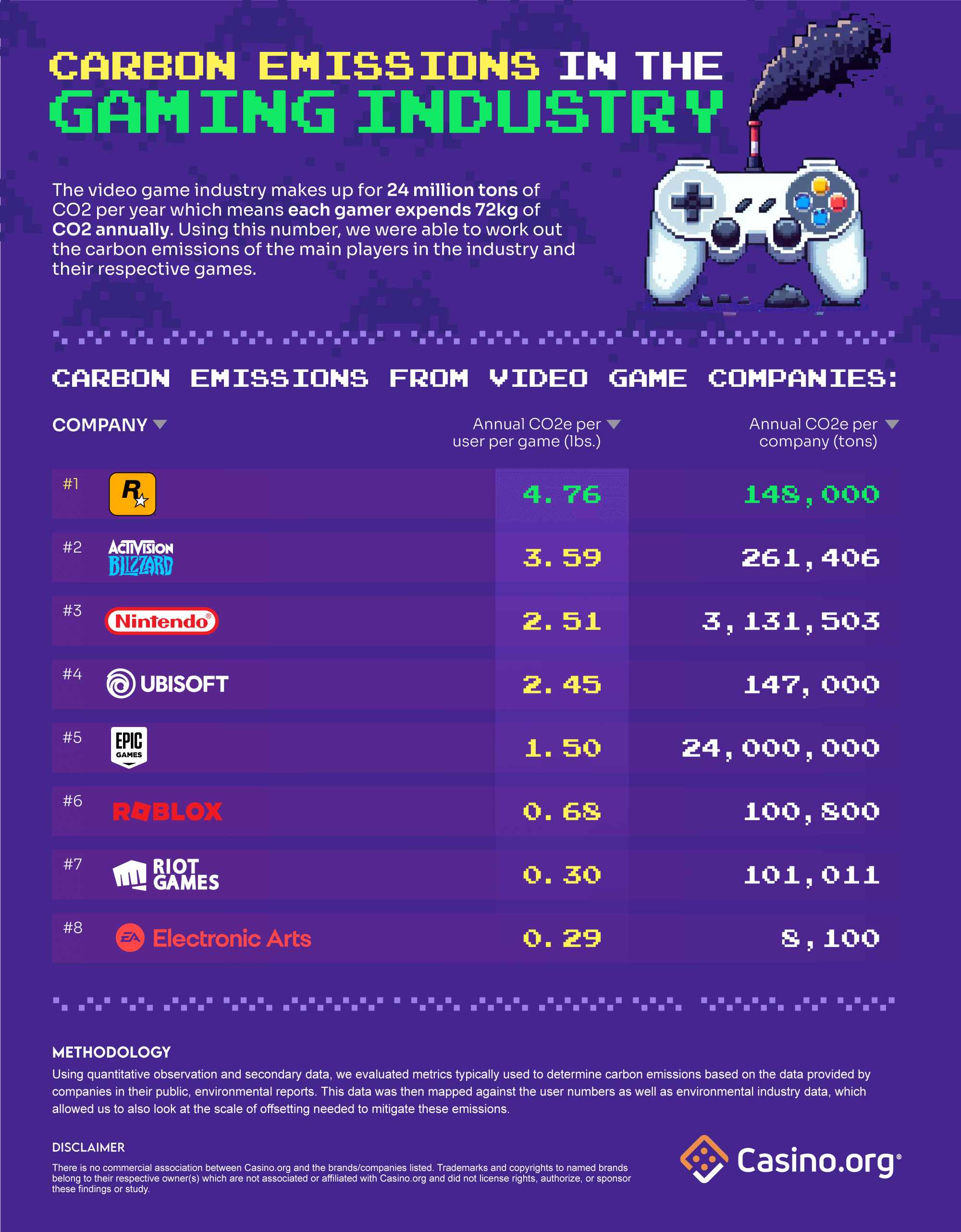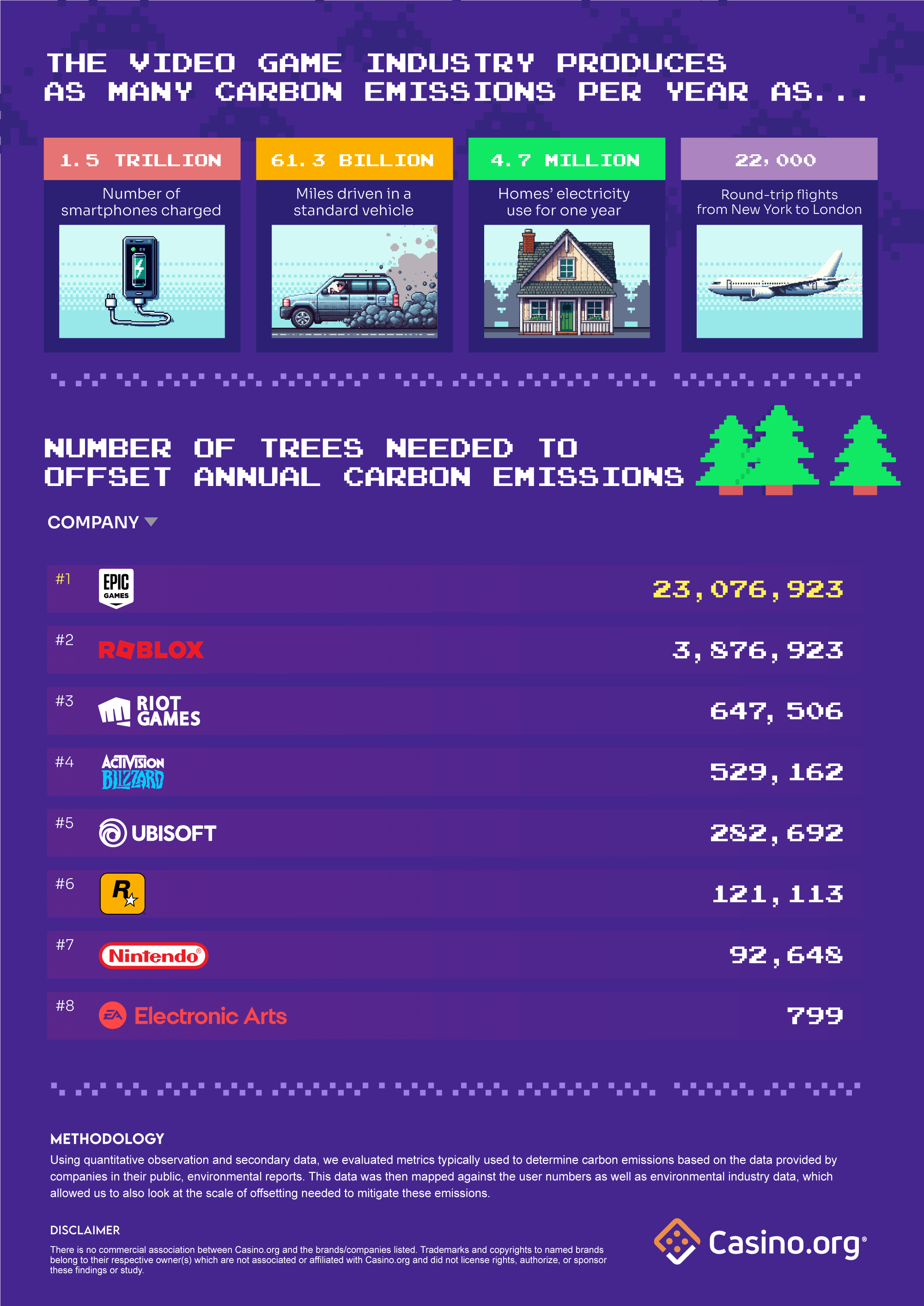What do video games and jumbo jets have in common? Carbon footprint, of course! Although scale has to be considered, video games contribute to carbon emissions in the same way that diesel tanks, airplanes, and oil factories do. Whether we're slamming down a controller in Call of Duty or racing through a virtual field in The Sims, our digital actions can have real-world consequences.
Although more and more video games are moving away from traditional disc-in consoles, games are still energy-hungry.We've come a long way from the plastic, clunky cartridges we once used to spice up our fun, but digital isn't inevitably Better.
To create an accurate estimate of the carbon footprint of each video game, we've compiled the factors that contribute to carbon emissions from video games, including server usage, human resources, updates, and console energy consumption. Analyzing the top 20 of 21 video gamescent After a century, we have been able to identify the environmental protagonists and carbon consuming culprits.
In addition to quantified carbon footprint estimates for each game, we've analyzed top video game companies and easy-to-understand comparisons to understand the true impact video games have on the environment.
Key findings:
- Grand Theft Auto is estimated to produce the most carbon emissions in the gaming industry
- Famous Fortnite ranks second in carbon emissions
- Electronic Arts, home of FIFA and The Sims, is ranked #1 as the greenest company with the lowest carbon footprint.
- The average gamer consumes 158 pounds of CO2e per year

Understand your exact carbon footprint
Despite public pressure on game companies to disclose their emissions, it is important to note that calculating the carbon footprint impact of each game and each company is not an easy task. For companies that provided public data on their environmental efforts, we were able to easily determine their carbon footprint based on the volume of games played within the company and the share of each game.
For companies that do not disclose their carbon emissions, we were able to calculate their carbon emissions by calculating their market share relative to the gaming industry's total annual carbon emissions of 24 million tons of CO2e.
Video games with the highest carbon footprint
It's no surprise that virtual gas-guzzling games lead to real-life damage. Grand Theft Auto, in all its Hummer theft and police chase glory, has the highest estimated carbon footprint in the industry.
The GTA franchise, operated by Rockstar Games, emits 4.76 CO2e per user per year. For those of us not adept at understanding carbon, this is 81% higher than the average of 2.01 CO2e. In layman's terms, if he played GTA for one year, he would have driven 12,174 miles on gas. His hypothetical GTA road trip might be just as worthwhile as the real one.
Rock stars aren't the only ones attracting ecology's attention. Epic Games ranks #1 for having the highest corporate carbon footprint. Epic Games emits an estimated 24 million tons of carbon dioxide annually. There are quite a few international flights. While that may seem like a lot (and it is), this number can be largely attributed to the sheer number of players the company attracts. Fortnite, the biggest game in their portfolio, boasts a whopping 650 million registered users. 650 million players requires a lot of server power, so all the zeros are hidden behind the net carbon emissions figure.
the greenest video game
However, all is not lost. Planting a tree in Tom Clancy's Ghost Reckon Breakpoint means planting a tree in the real world. Green Gamer isn't necessarily a myth or a marketing scheme, as some companies are making it a reality.
Electronic Arts, home of The Sims and FIFA, reported the lowest carbon emissions of all publicly available data for the industry at 8,100 CO2e. That's why The Sims is going all out! You'll feel much better knowing that of all the major gaming industries, this one is the least painful at just 0.29 pounds. His CO2e amount per year per average user.

Video games most likely to achieve carbon neutrality
Unfortunately, another environmental unknown is how well these companies are working to improve their carbon footprint. As gamers, we rarely know what goes on behind closed doors and only see the magic that appears on screen. However, some companies are positive about their contribution and have plans to change that. Among the companies that have listed a date for their carbon neutrality goal, here are their projected timelines:
- 2027: Electronic Arts
- 2030: Epic Games
- 2050: Riot Games, Nintendo, Activision Blizzard
Other companies, like Roblox, have made no public statements about their environmental efforts, but carbon neutrality remains a mystery.
How many trees need to be planted to offset emissions from the game?
It may feel gloomy and hopeless so far, but alas, there is light at the end of this tunnel. You can calculate the exact amount of “carbon sequestration” so there is no need to play games. From what we know, the average gamer spends £158. The average gamer would need to plant 2.77 trees per year to offset their emissions. The way things work, that's not such a bad thing.
carbon conclusion
You don't need to bury your Xbox to save the planet, or boycott Fortnite to glorify FIFA. The game is meant to be fun, but it's a gentle reminder that even seemingly harmless things can have an impact on the environment. So press play! However, in the meantime, be sure to plant one or two trees. Your virtual self will thank you.
methodology
We used quantitative observations and secondary data to evaluate metrics typically used to determine carbon emissions based on data provided by companies in their public environmental reports. This data can then be matched against user count and environmental industry data to also see the scale of offsets required to mitigate these emissions.
Disclaimer
There is no commercial relationship between Casino.org and the brands/companies listed. Trademarks and copyrights of the named brands are the property of their respective owners. These owners are not affiliated with or affiliated with Casino.org, and do not license or authorize rights to or sponsor these findings or research.
fair use
Please feel free to use the data and images on this page for non-commercial purposes. Please be sure to include a proper attribution link to this page to credit the author.
For media questions, please contact riley.clark.[at]casino.org


